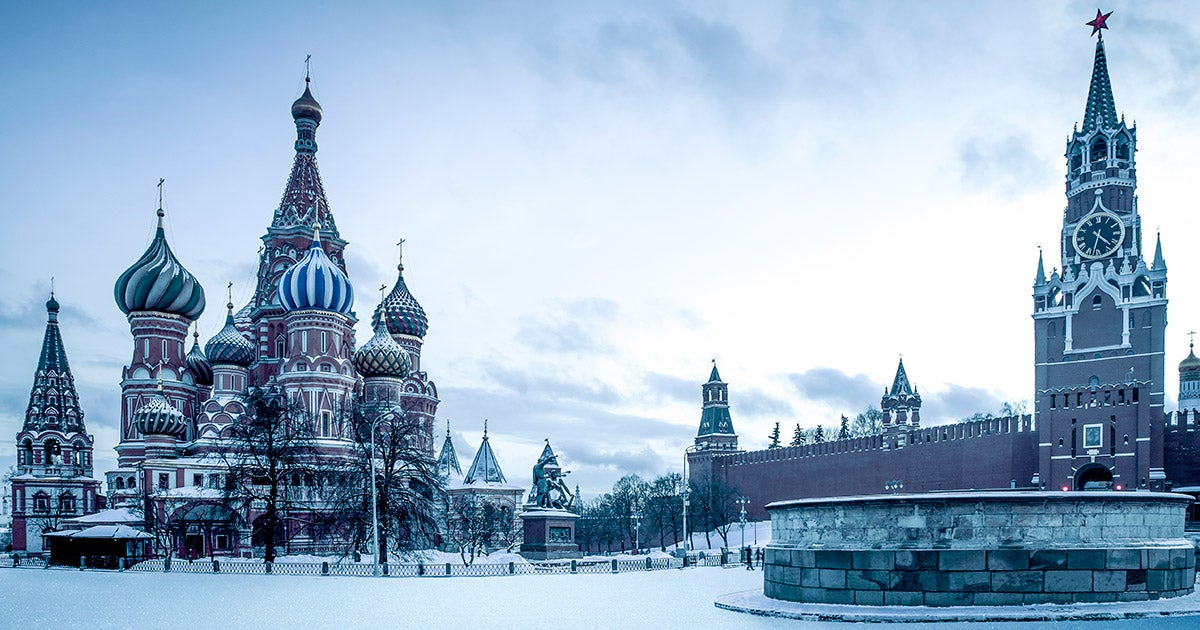
The Intelligence Project hosted Fiona Hill for a conversation on the state of Russia’s relations with the United States and the West.
Stephanie Mitchell/Harvard Staff Photographer
From Russia, without love
The new U.S. administration, unlike the last, will take a hard line on key issues, with intransigence likely on both sides, says analyst Fiona Hill
After U.S. intelligence confirmed on Monday that Moscow had run propaganda and disinformation campaigns against now-President Biden during the 2020 election, Russia expert Fiona Hill, A.M. ’91, Ph.D. ’98, offered candid assessments Wednesday on the dim prospect for reducing tensions between the two governments.
In a 75-minute online discussion with Paul Kolbe, executive director of the Belfer Center’s Intelligence Project at Harvard Kennedy School, Hill, who served as deputy assistant to the president and senior director for European and Russian Affairs at the National Security Council from 2017 to 2019, said it’s no surprise that Russia conducted influence campaigns to denigrate Joe Biden’s prospects and boost Donald Trump’s chances for reelection, and that these likely were authorized by Russia President Vladimir Putin.
Hill, who co-wrote what many consider the definitive Putin biography, “Mr. Putin: Operative in the Kremlin” (2013), said Russia’s targeting of Biden, beginning when he was vice president, should have been expected given his potential to become a top Democratic contender in both the 2016 and 2020 presidential elections.
“The Russians know that there will be no surprises with Biden. He is what he is and he’ll do what he says, or he’ll try to,” said Hill. “They’ve frankly enjoyed the chaos in U.S. politics the last four years.”
Though she had not yet read the declassified report, Hill said election interference and propaganda campaigns to sow divisions have been part of Russia’s stock in trade in countries around the world, including the U.S., since the Cold War.
“What’s changed is the tools. What hasn’t changed, very sadly, is the kind of pattern of these relationships and the fact that we still find ourselves in confrontation with Russia like we did with the Soviet Union,” she said.
Despite shared interests on issues such as COVID-19 vaccine research and climate change in the Arctic, tensions between the U.S. and Russia will limit what gets accomplished during a Biden administration, as Putin continues to settle old political scores against the U.S., tries to undermine Western alliances, and aims to demonstrate to the world that he still has the upper hand in the U.S.-Russia relationship.
“The pandemic ought to have been a fantastic opportunity to work together, and it has been anything but,” Hill said.
Signaling that he will not continue the Trump administration’s kid-glove treatment of Russia, Biden called Putin “a killer” and promised that Moscow will “pay the price” for interfering in the 2020 election during a TV interview Wednesday. The remark seemed to infuriate Putin, who characterized the current state of US-Russia relations as “very bad” and swiftly recalled its U.S. envoy to Moscow. Since taking office, Biden has instituted sanctions against Russia for the SolarWinds cyberattack and the imprisonment of dissident Alexei Navalny. He has promised further sanctions, this time over the Nord Stream 2 gas pipeline in Europe and Russia’s efforts to influence the outcome of U.S. elections once more, as the newly-declassified March 15 U.S. intelligence report detailed.
“We have to find some method of taking the edge off this confrontational relationship. There’s no good reason for why we’re just careening from crisis to confrontation and back again.”
Fiona Hill
Yet Hill cautioned that sanctions against Russia are not nearly as effective a tool as they once were, partly because so many are already in effect, and partly because they may have unintended consequences if not done strategically. Russia’s integration in the global economy, particularly in the energy sector, makes it much harder to isolate it or to apply targeted sanctions that don’t also collaterally damage U.S. allies in Europe. Also, she said, the U.S. tendency to act unilaterally on sanctions at times has created resentment in Europe, friction that Russia can exploit.
“Russia is not just in the business of espionage, they’re in the business of trying to undermine the cohesion in societies and the relations among and between key countries, including within the European Union,” she said.
U.S.-imposed sanctions are only effective if imposed in unison with Europe, she said. Some sanctions that could be effective, such as on Russian sovereign debt or on oligarchs individually, have been largely avoided because of their potentially negative secondary and tertiary effects.
“We’ve been trying to target these sanctions on changing Russian behavior. Unless we change Russia’s threat perception, they’re not going to change their behavior because their behavior is geared to protecting themselves and increasing their room for maneuver,” said Hill. “Why would they change that if they still think we’re a threat?”
It’s in the U.S.’ interest to try to stabilize relations with Russia, “but have realistic, very low-bar expectations,” said Hill. “We have to find some method of taking the edge off this confrontational relationship. There’s no good reason for why we’re just careening from crisis to confrontation and back again.”
Diplomacy is still important and messaging between both sides about the “rules of the road” — what’s acceptable and what’s not — must be ongoing, she said. That won’t stop Russia from cyber hacking, for example (“it’s too useful for them”), but the U.S. should at least engage in dialogue so expectations and consequences are clear to both sides.
America should try to find some areas where both sides can engage. “And then see how they respond. Because frankly, over the last four years, they had an opportunity there if they really wanted it with Trump,” said Hill. “And look what happened: all kinds of provocations.”
Asked about China and Russia’s new defensive partnership in space, Hill said the seemingly simpatico relationship is likely only temporary, built on a mutual irritation with the U.S. The vast power imbalance between China and Russia, and a long-simmering territorial dispute on the China-Russia border, suggest the partnership will be short-lived, she said. Russia may even come to regret remaining as hostile to the U.S. as it has been.
Until Putin gets over the traumas he believes Russia endured during the collapse of the Soviet Union in the late 1980s and 1990s, the U.S. will be seen as a foe to be vanquished, she said.
“My assessment over the last four years is it was just too tempting to play around, to kick us under the table. They wanted to sit at the table, but they wanted to kick us under it the whole time to make us bleed and bruise because it’s still part of that idea that they’re getting revenge for the humiliations … at the end of the Cold War. And they, Putin and the people around him, have just not got that out of their systems,” said Hill. “They still see the United States with that very dark view, and it’s going to take some real effort to change that.”







